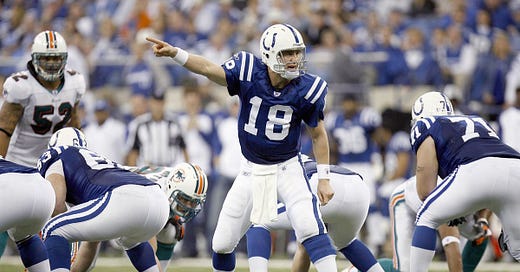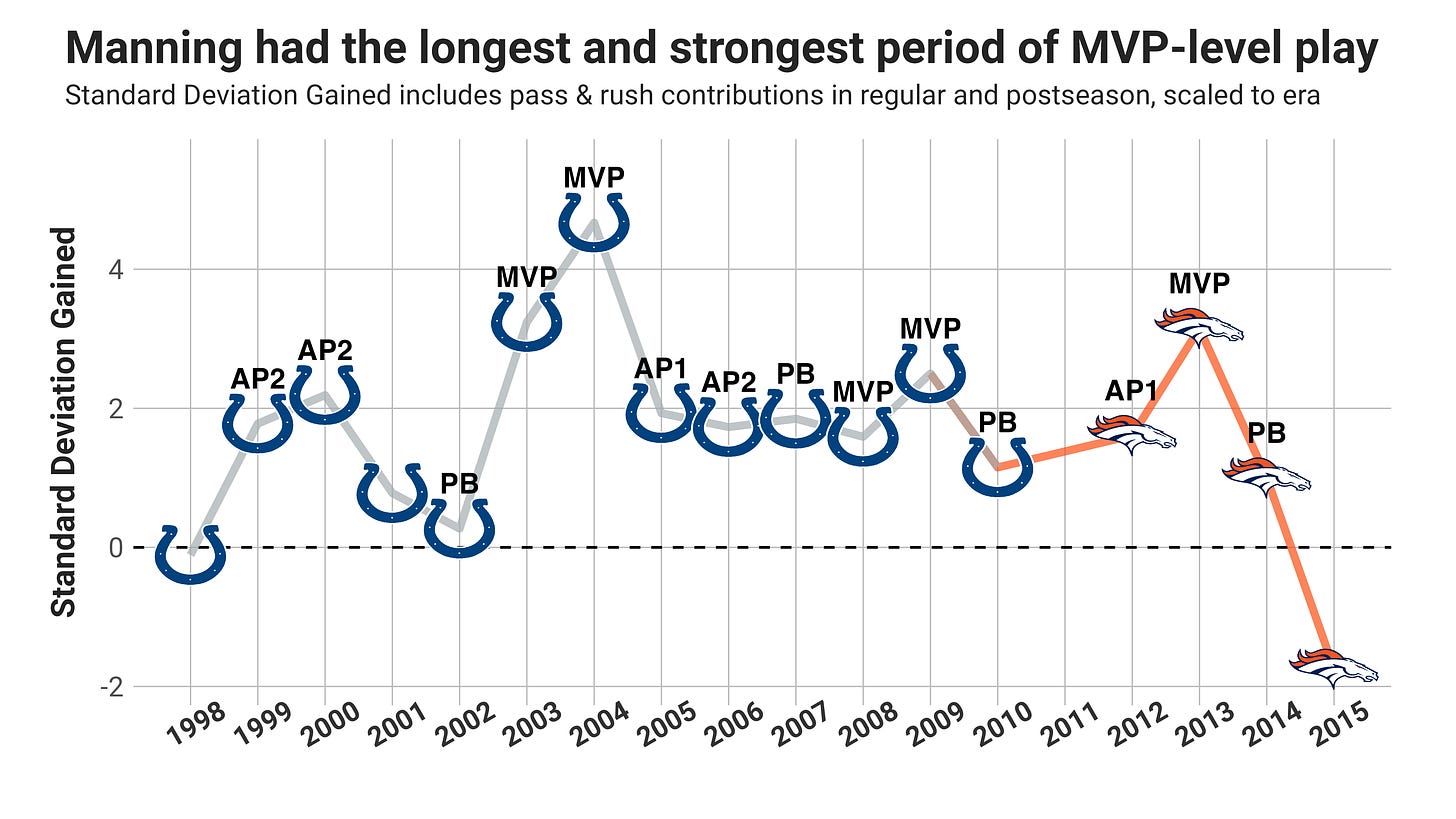The QB GOAT Series: No. 1
Peyton Manning was at the top of the NFL for 15 years and redefined the position, but couldn't find the same level of success in the postseason
I don’t agree 100% with all the rankings, but the beauty of stats-based analysis is that we can take representative data from nearly one million quarterback dropbacks over a century of the modern NFL to rank-order quarterbacks by value. Good luck watching, grading and comparing every quarterback snap from 1947 to 2022 and then forming your own film-watcher list.
Links to past posts:
20-18 (Jurgensen, Bradshaw, Moon), 17-15 (Staubach, Tarkenton, Rivers),
14-12 (Favre, Warner, Anderson), 11-9 (Mahomes, Fouts, Unitas),
No. 1: PEYTON MANNING
Regular: 1st, Peak: 1st, Playoffs: 12th
Yes, I’ve done the unacceptable and put Peyton Manning at the top of the GOAT series, not Tom Brady. I explained a lot of the rationale in Brady’s write-up, which can be summed up as: it’s really too close to call. Brady is the clear winner in longevity and Super Bowl victories, but Manning was the best regular season quarterback ever, and it’s not particularly close. Even in the playoffs, it’s not an overwhelming victory for Brady in value added, especially if you discount Manning’s last two physically compromised postseasons.
To say that Manning laps the field in his level of sustained excellence isn’t hyperbole. For accolades, Manning has the most MVP ever (five to Aaron Rodgers’ four) and the most All-Pro First-Team selections (seven to Johnny Unitas’ five). Manning was selected another three times as Second-Team All-Pro, meaning he was considered the best or second-best quarterback in the NFL 10 times (Unitas second with seven). Looking at Manning’s efficiency versus the field, he had nine different seasons with at least 1.5 standard deviations better efficiency than average - no other quarterback has more than five (Rodgers).
I use ANY/A in this analysis to compare throughout eras, but most of Manning’s career is recent enough to have expected points added data, which does a better job of accounting for the exact values gain/lost on the play-by-play basis. From 2002 to 2013, Manning finished no worse than third in total EPA, including six first place finishes (Rodgers 3 and Brady 3) and three second place.
It’s often said that Manning and the other elite quarterbacks from 2000-2020 played in the greatest era for quarterbacks, but it might be more accurate to say that Manning triggered the greatest era himself. No one had more influence on the way the quarterback position shifted to pre-snap, on-the-field adjustments than Manning. He essentially was the offensive scheme, not just excellent at executing someone else’s. Manning was so successful with so many different receivers because he had the answers to whatever the defense was throwing at him, even if they were taking away his lead receiver, or giving him a look that wasn’t ideal for the play as called. The way that quarterback was played by Brady, Brees, Rodgers, Roethlisberger and Ryan is a product of Manning’s blueprint. In more recent years, the likes of Patrick Mahomes and Josh Allen have shifted quarterback play in dual direction of mobility and mental adjustments, but the previous era belongs to Manning.
What Manning understood intuitively the risk-reward dynamic of quarterback play, optimizing win probability under all circumstances. Manning was the most efficient quarterback ever, but also in the top-25 for most three-interception games, knowing that increasing the chance for a couple more mistakes on the box score is worth it when trailing by multiple scores. He was also one of the best sack avoiders of all-time, a commonly undervalued trait. When Manning was out for the 2011 season, the Colts sack rate jumped to 6.2% from 2.3%, and the Broncos fell from 8% to 3% in Manning’s first year in Denver.
Keep reading with a 7-day free trial
Subscribe to Unexpected Points to keep reading this post and get 7 days of free access to the full post archives.






